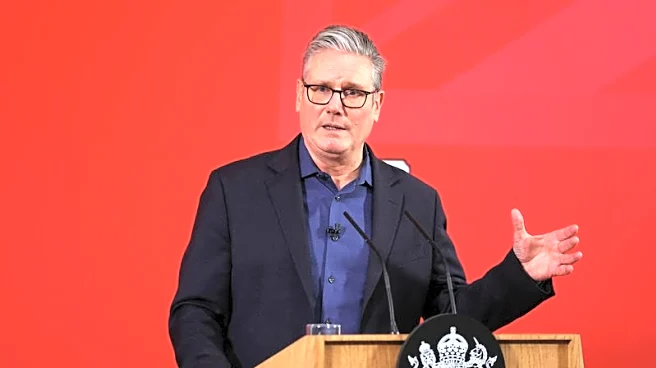What's Happening?
Israel launched airstrikes on southern Gaza early Sunday, marking the first major test of its ceasefire with Hamas. The ceasefire, brokered by President Trump, came into effect on October 10, with both sides agreeing to release hostages and prisoners.
However, Israel accused Hamas of violating the ceasefire by attacking its forces in the Rafah area. Hamas denied any involvement in clashes and accused Israel of fabricating pretexts for its actions. The Israel Defense Forces stated that the strikes were aimed at eliminating threats posed by militants and dismantling military structures used for terrorist activities. Prime Minister Benjamin Netanyahu directed officials to take strong action against terrorist targets in Gaza, while Defense Minister Israel Katz emphasized the IDF's determination to protect its soldiers.
Why It's Important?
The ceasefire between Israel and Hamas is crucial for stabilizing the region and preventing further escalation of violence. The accusations and subsequent airstrikes highlight the fragility of the truce and the challenges in maintaining peace. The ongoing conflict affects humanitarian efforts, with aid delivery to Gaza being a critical component of the ceasefire agreement. The situation impacts regional stability and international relations, particularly involving the United States, which brokered the deal. The continuation of hostilities could lead to further civilian casualties and displacement, exacerbating the humanitarian crisis in Gaza.
What's Next?
The ceasefire agreement includes provisions for increased aid into Gaza, where famine has been declared in some areas. The Rafah crossing between Gaza and Egypt remains closed, affecting the movement of people and goods. Both sides are expected to continue negotiations to address violations and ensure compliance with the ceasefire terms. The international community, including the United States, may increase diplomatic efforts to mediate and prevent further escalation. Monitoring and verification mechanisms may be strengthened to ensure adherence to the ceasefire and facilitate humanitarian aid.
Beyond the Headlines
The ceasefire violations raise ethical and legal questions about the conduct of military operations and the protection of civilians in conflict zones. The situation underscores the complexities of negotiating peace in a region with deep-seated historical and political tensions. Long-term peace efforts may require addressing underlying issues such as territorial disputes, security concerns, and the rights of displaced populations. The role of international organizations and mediators in facilitating dialogue and ensuring accountability is critical for achieving sustainable peace.

















